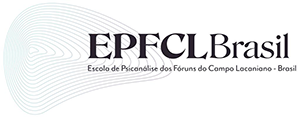End of analysis and pass: a comment about the passer and the echoes of a real in the body
Keywords:
Lacan, Subjective dismissal, Body, End of analysis, PassAbstract
The path of an analysis begins at the “entrance pass”, the effect of a subjective rectification, and may finish with its end, which would be the passage from psychoanalysand to psychoanalyst. This passage implies a journey through symptom and fantasy and the subjective dismissal that correlates with the crossing of the fantasy, but also the emergence of a new desire whose index would be the affection of enthusiasm. The consequence of the “original experience” of the analysis is precisely what the pass device aims to identify, as a way of evaluating the work and training of analysts in a school, by seeking to collect in the “exit pass” of the analysis the effects of that pass. In this sense, the pass would be a way of assessing whether “the real at stake in the formation of the analyst”, as Lacan says, would be active in this formation. Finally, the passer would be someone who, being in the process of completing their analysis, would be sensitive to the evidences of the end in the passing's testimony and could identify them through the echoes of that testimony in their body. The passer would then function as a sounding board that can echo with their body something of the real that was passed on to them by the passing
Downloads
References
Fingermann, D. (2011). A presença do passador: atualidade da Escola. Wunsch, (11).
Jardim, J., & Carvalho, V. (2001). Janela da alma. Rio de Janeiro: Copacabana Filmes e Produções.
Lacan, J. (1986). O seminário, livro 7: a ética da psicanálise. Trad. Antonio Quinet.
Rio de Janeiro: Zahar. (Trabalho original publicado em 1959-1960).
Lacan, J. (1995a). O seminário, livro 4: a relação de objeto. Trad. D. D. Estrada. Rio de Janeiro: Zahar. (Trabalho original publicado em 1956-1957).
Lacan, J. (1995b). Sobre a experiência do passe. Letra Freudiana: Escola Psicanálise e Transmissão, Documentos para uma escola II. Lacan e o passe, XIV(0). (Trabalho original publicado em 1973).
Lacan, J. (1998a). Intervenção sobre a transferência. In J. Lacan. Escritos. Trad. Vera Ribeiro, (pp. 214). Rio de Janeiro: Zahar. (Trabalho original publicado em 1951).
Lacan, J. (1998b). Função e campo da fala e da linguagem. In J. Lacan. Escritos. Trad.
Vera Ribeiro (pp. 238). Rio de Janeiro: Zahar. (Trabalho original publicado em 1953).
Lacan, J. (1998c). A direção do tratamento e os princípios de seu poder. In J. Lacan. Escritos. Trad. Vera Ribeiro (pp. 591). Rio de Janeiro: Zahar. (Trabalho original publicado em 1958).
Lacan, J. (1998d). Subversão do sujeito e dialética do desejo no inconsciente freudiano. In J. Lacan. Escritos. Trad. Vera Ribeiro (pp. 807). Rio de Janeiro: Zahar. (Trabalho original publicado em 1960).
Lacan, J. (2003a). Proposição de 9 de outubro de 1967 sobre a formação do analista. In J. Lacan. Outros escritos. Trad. Vera Ribeiro (pp. 248). Rio de Janeiro: Zahar. (Trabalho original publicado em 1967).
Lacan, J. (2003b). Nota italiana. In J. Lacan. Outros escritos. Trad. Vera Ribeiro (pp. 311). Rio de Janeiro: Zahar. (Trabalho original publicado em 1974).
Lacan, J. (2005). O seminário, livro 10: a angústia. Trad. Vera Ribeiro. Rio de Janeiro: Zahar. (Trabalho original publicado em 1962-1963).
Menegassi, A. (2010). O conceito de destituição subjetiva na obra de Jacques Lacan. Dissertação de mestrado, Instituto de Psicologia, Universidade de São Paulo, São Paulo.
Metzger, C.: (2018). Prefácio. In Soler, C.: Adventos do real: da angústia ao sintoma. São Paulo: Aller, 2018.
Rojas, R., & Fingermann, D. (2011). Thesaurus sobre o passador. Wunsch, (11).
Soler, C. (2002). Variantes de destituição subjetiva: suas manifestações, suas causas. Aulas 1 e 2. Stylus: Revista de Psicanálise, Rio de Janeiro, (5).
Soler, C. (2017a). Advento do real. Pré-texto do Encontro Internacional de Barcelona (setembro de 2018). Recuperado de https://www.champlacanien.net/public/docu/4/rdv2018pre1.pdf
Soler, C. (2017b). A hysterização de entrada em análise. Wunsch, (16).
Soler, C. (2018). Adventos do real: da angústia ao sintoma. São Paulo: Aller.
Thamer, E. (2018a). Pré-texto 9 do Encontro Internacional de Barcelona (setembro de 2018). Do real advindo pela análise. Recuperado de http://xcita-if-epfcl.barcelona/Documentos/Pre-textos/(Pg)Pre-text09-Thamer.pdf
Thamer, E. (2018b). Sobre os limites do saber. Stylus: Revista de Psicanálise, (35), 179-186. Recuperado de http://stylus.emnuvens.com.br/cs/article/view/193/137
Downloads
Published
How to Cite
Issue
Section
License
Ao encaminhar os originais, os autores cedem os direitos de publicação para STYLUS.
Os autores assumem toda responsabilidade sobre o conteúdo do trabalho, incluindo as devidas e necessárias autorizações para divulgação de dados coletados e resultados obtidos, isentando a Revista de toda e qualquer responsabilidade neste sentido.



